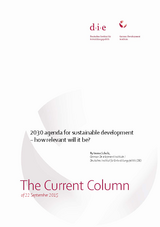The Current Column
2030 agenda for sustainable development – how relevant will it be?
Scholz, ImmeThe Current Column (2015)
Bonn: German Development Institute / Deutsches Institut für Entwicklungspolitik (DIE) (The Current Column of 22 September 2015)
Bonn, 22 September 2015. This coming weekend the General Assembly of the United Nations (UN) is set to pass a new agenda that is intended to apply for the next decade and a half and that identifies 17 fundamental areas of action in order to significantly improve the living conditions of all people while remaining within the ecological boundaries of the earth system. Will this work programme be relevant for domestic political and social action in rich and poor countries alike, as well as for international co-operation?
In the political debate regarding the relevance of the 2030 agenda for sustainable development there was considerable focus on the broad scope of the agenda: would the integration of socio-economic, political and ecological targets result in positive or negative effects? The sceptics state that too many goals will result in no clear priorities being visible, with focus shifting away from the poorest sections of the population. This would lead to a loss of key incentives for involvement on the part of governments. Conversely, those in favour of the new direction – including myself – consider this breadth to be the quality of the 2030 agenda that will motivate action. The new process of negotiation for the 2030 agenda started in 2013 with several months of stocktaking on problem definitions and proposed solutions in 21 areas of action, as listed in the Declaration of the Rio+20 conference negotiations on a text specifying universal goals and targets for sustainable development that was to be submitted to the UN General Assembly were taken up at a later stage. Approximately 70 government representatives took part in this process of communication, negotiation and compromise – and their proposal of 17 goals and 169 sub-goals proved to be so balanced that it was possible to include controversial topics such as gender equality, rule of law, inequality within and among countries as well as protection of ecosystems on land and water in the agenda. Ultimately, no-one dared to open up the overall package again, as this would have meant endangering their own priorities as a consequence. And it is not only with regard to negotiation and compromise that this breadth has had a positive effect: it can also be regarded as an emerging normative understanding between rich and poor countries that human well-being extends beyond overcoming extreme poverty and providing a basis for health, education and equality. Beyond this, it is of decisive importance for the interests of future generations that dangerous changes in key functions of the earth's ecosystem are avoided, as these will undermine and reverse all of the key achievements in poverty reduction. The causes of these environmental changes can be traced back to patterns of production and consumption that characterize both industrialisation processes and present-day affluent societies. Tackling poverty and improving prosperity can therefore not be successful in the 21st century if they fail to acknowledge and address the interaction between prosperity and the environment. Therefore, the 2030 agenda needs to focus on the poorest sectors of society and countries, yes – but also on the rich countries, the global middle classes and policy areas beyond those which were covered by the Millennium Development Goals. For this broad agenda to be successful, we need to avoid treating the relationship between environment and development as a technical constraint for prosperity. Normative and political decisions are involved in defining this relationship, and therefore it is necessary to strengthen political participation and the rule of law – together with international co-operation that values the global common good. To tackle environmental change and inequality, international cooperation and fair rules are needed more than ever, also for the benefit of the pursuit of the national common good. Admittedly it is also possible to interpret the 2030 agenda sceptically, in particular when one compares the ambition of its preamble with the vagueness of several goals and targets: extreme poverty is only to be eradicated by 2030; the known limits of the earth’s carrying capacity are not mentioned enough (instead, a lot is said regarding economic growth); there is no clear language on decarbonisation of production, transport or consumption; human rights are mentioned in the preamble and declaration, but are scarcely evident as guiding elements in the goals and targets; no timetable is set for achieving gender equality. These deficiencies of the agenda, however, occur in policy areas which are marked by controversies not only between states, but also within many countries. Overall, I conclude that the negotiators have done a good job with the 2030 agenda – it is hard to imagine a more precise and ambitious result that the governments of all states could agree to. Particular praise is reserved for the negotiators from Germany and the European Union. The fact that the 2030 agenda has been drawn up and is now set to be approved is of great value in itself, if one considers the major crises and challenges with which the international community is confronted at present. It will be interesting to hear what the heads of state and government have to say about the 2030 agenda at the UN summit in New York this weekend.


